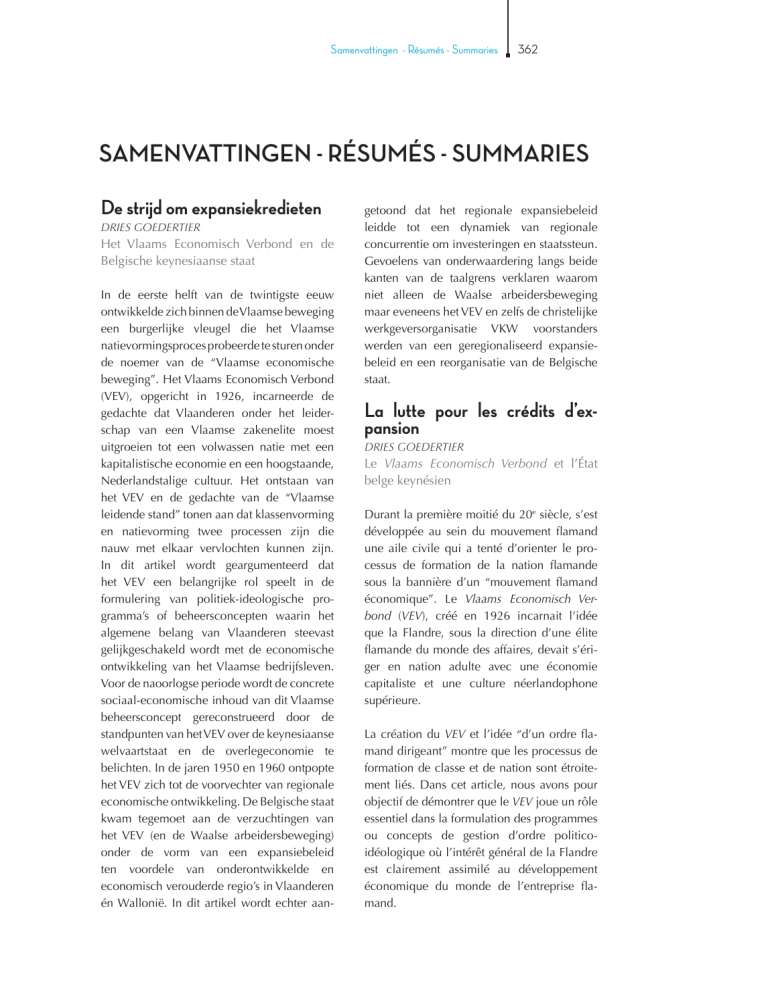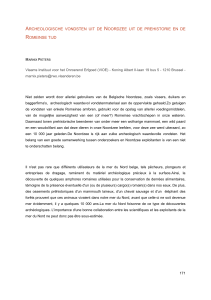
Samenvattingen - Résumés - Summaries
362
SAMENVATTINGEN - RÉSUMÉS - SUMMARIES
De strijd om ex­pansiekredieten
DRIES GOEDERTIER
Het Vlaams Economisch Verbond en de
Belgische keynesiaanse staat
In de eerste helft van de twintigste eeuw
ontwikkelde zich binnen de Vlaamse beweging
een burgerlijke vleugel die het Vlaamse
natievormingsproces probeerde te sturen onder
de noemer van de “Vlaamse economische
beweging”. Het Vlaams Economisch Verbond
(VEV), opgericht in 1926, incarneerde de
gedachte dat Vlaanderen onder het leider­
schap van een Vlaamse zakenelite moest
uitgroeien tot een volwassen natie met een
kapitalistische economie en een hoogstaande,
Nederlandstalige cultuur. Het ontstaan van
het VEV en de gedachte van de “Vlaamse
leidende stand” tonen aan dat klassenvorming
en natievorming twee processen zijn die
nauw met elkaar vervlochten kunnen zijn.
In dit artikel wordt geargumenteerd dat
het VEV een belangrijke rol speelt in de
formulering van politiek-ideologische pro­
gramma’s of beheersconcepten waarin het
algemene belang van Vlaanderen steevast
gelijkgeschakeld wordt met de economische
ontwikkeling van het Vlaamse bedrijfsleven.
Voor de naoorlogse periode wordt de concrete
sociaal-economische inhoud van dit Vlaamse
beheersconcept gereconstrueerd door de
standpunten van het VEV over de keynesiaanse
welvaartstaat en de overlegeconomie te
belichten. In de jaren 1950 en 1960 ontpopte
het VEV zich tot de voorvechter van regionale
economische ontwikkeling. De Belgische staat
kwam tegemoet aan de verzuchtingen van
het VEV (en de Waalse arbeidersbeweging)
onder de vorm van een expansiebeleid
ten voordele van onderontwikkelde en
economisch verouderde regio’s in Vlaanderen
én Wallonië. In dit artikel wordt echter aan­
getoond dat het regionale expansiebeleid
leidde tot een dynamiek van regionale
concurrentie om investeringen en staatssteun.
Gevoelens van onderwaardering langs beide
kanten van de taalgrens verklaren waarom
niet alleen de Waalse arbeidersbeweging
maar eveneens het VEV en zelfs de christelijke
werkgeversorganisatie VKW voorstanders
werden van een geregionaliseerd expansie­
beleid en een reorganisatie van de Belgische
staat. x
La lutte pour les crédits d’ex­
pansion
DRIES GOEDERTIER
Le Vlaams Economisch Verbond et l’État
belge keynésien
Durant la première moitié du 20e siècle, s’est
développée au sein du mouvement flamand
une aile civile qui a tenté d’orienter le pro­
cessus de formation de la nation flamande
sous la bannière d’un “mouvement flamand
économique”. Le Vlaams Economisch Ver­
bond (VEV), créé en 1926 incarnait l’idée
que la Flandre, sous la direction d’une élite
fla­mande du monde des affaires, devait s’éri­
ger en nation adulte avec une économie
capi­
taliste et une culture néerlandophone
supérieure.
La création du VEV et l’idée “d’un ordre fla­
mand dirigeant” montre que les processus de
formation de classe et de nation sont étroite­
ment liés. Dans cet article, nous avons pour
objectif de démontrer que le VEV joue un rôle
essentiel dans la formulation des programmes
ou concepts de gestion d’ordre politicoidéologique où l’intérêt général de la Flandre
est clairement assimilé au développement éco­­nomique du monde de l’entreprise fla­
mand.
363
Samenvattingen - Résumés - Summaries
Pour la période d’après-guerre, le volet socioéconomique de ce concept de gestion est
reconstruit en développant les points de vue
du VEV sur l’État-providence et l’économie
de concertation. L’État belge a rencontré les
aspirations du VEV (et du mouvement ouvrier
wallon) sous la forme d’une loi d’expansion
au bénéfice des régions sous-développées et/
ou économiquement vieillies qu’étaient la
Flandre et la Wallonie.
Dans cet article, nous montrons que la poli­
tique d’expansion économique régionale a
dé­bouché sur une dynamique de concurrence
ré­
gionale pour les investissements et l’aide
de l’État. Des sentiments de sous-estimation
de part et d’autre de la frontière linguistique
expliquent pourquoi non seulement le mou­
vement ouvrier wallon mais aussi le VEV et
même l’organisation patronale chrétienne, le
VKW, ont été partisans d’une politique d’ex­
pansion régionale et une réorganisation de
l’État belge.
The Battle for Expansion Credit
DRIES GOEDERTIER
The Vlaams Economisch Verbond (“Flemish
Economic Alliance”) and the Keynesian
state
During the first half of the 20th century a civic
wing developed within the Flemish movement
that tried to organize the Flemish nationbuilding process under the umbrella of an
“economic Flemish Movement”. The Vlaams
Economisch Verbond (VEV), founded in 1926,
epitomised the idea that, under the leadership
of a Flemish business elite, Flanders should
become a developed nation with a capitalist
economy and a distinct culture based on the
Dutch language.
The birth of the VEV and the idea of the
“leading Flemish class” demonstrate that
class-formation and nation-building can be
closely interlinked processes. This article
argues that the VEV played an important role
in formulating a politico-ideological program­
me or theory in which the general interest
of Flanders was invariably connected to the
economic development of Flemish businesses.
During the post-war period, the concrete
socio-economic content of this ideology
was built around the VEV’s reactions to the
Keynesian welfare state and the collective
bargaining economy.
During the 1950s and 1960s, the VEV cham­
pioned regional economic development. The
Belgian state met the demands of the VEV (and
of the Walloon workers’ movement) with an
expansionist economic policy that supported
underdeveloped and economically-backward
areas in Flanders and Wallonia. This article
shows that this regionalist expansion policy
caused a dynamic of regional competition for
investment and state sponsorship. Feelings of
neglect on both sides of the language
border explain why not only the Walloon
workers’ movement but also the VEV, and
even the Catholic Employers’ Organization
(VKW), beca­me supporters of a regionalised
expansion po­licy and a reorganisation of the
Belgian state.










